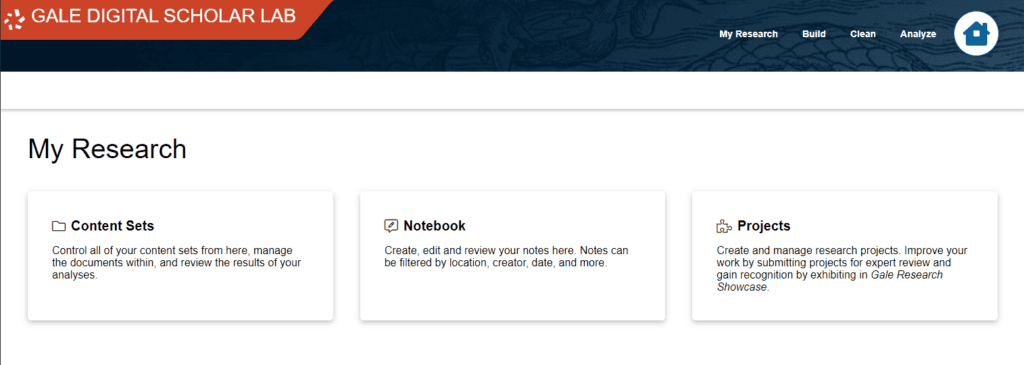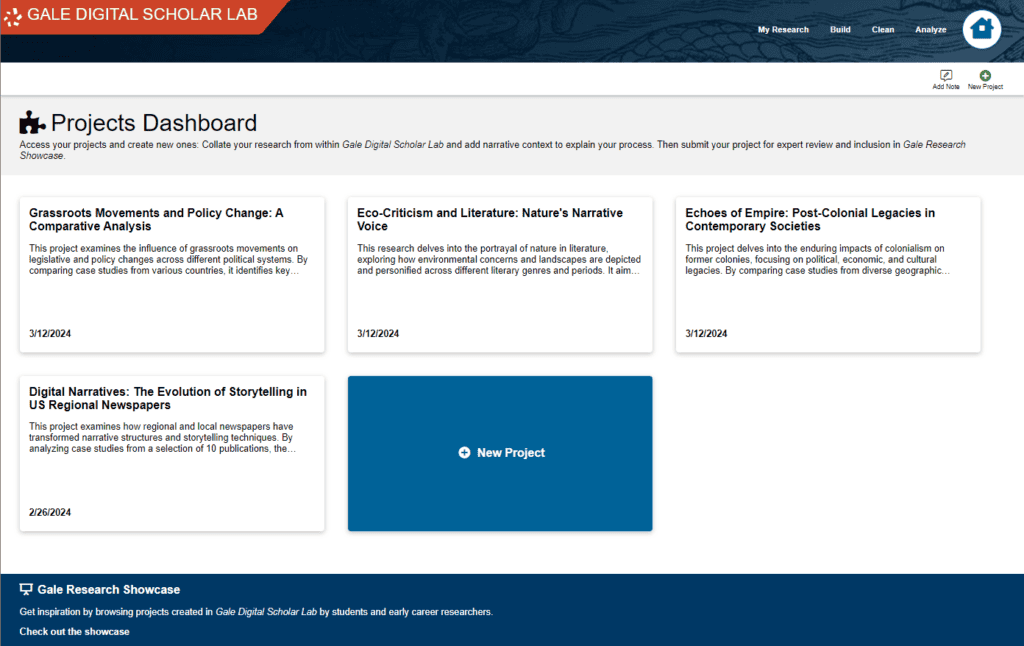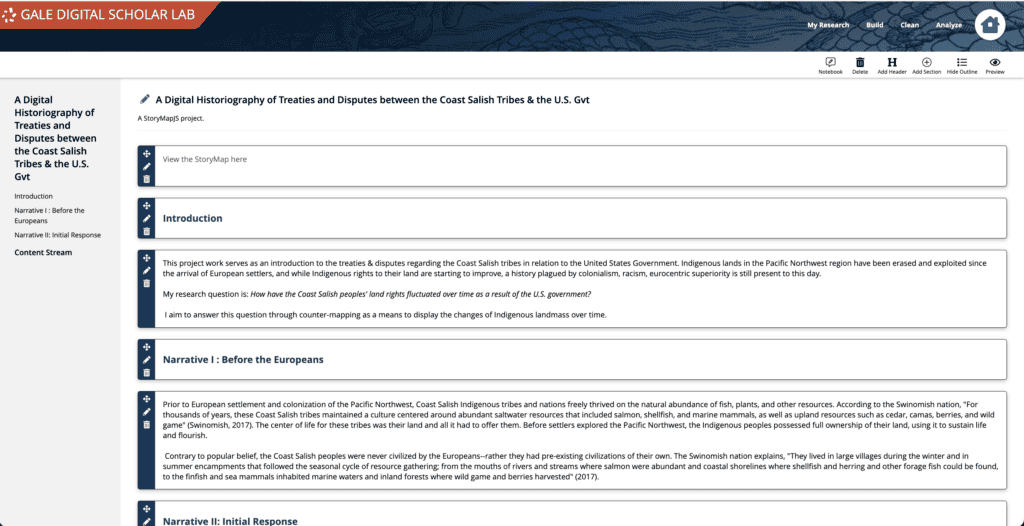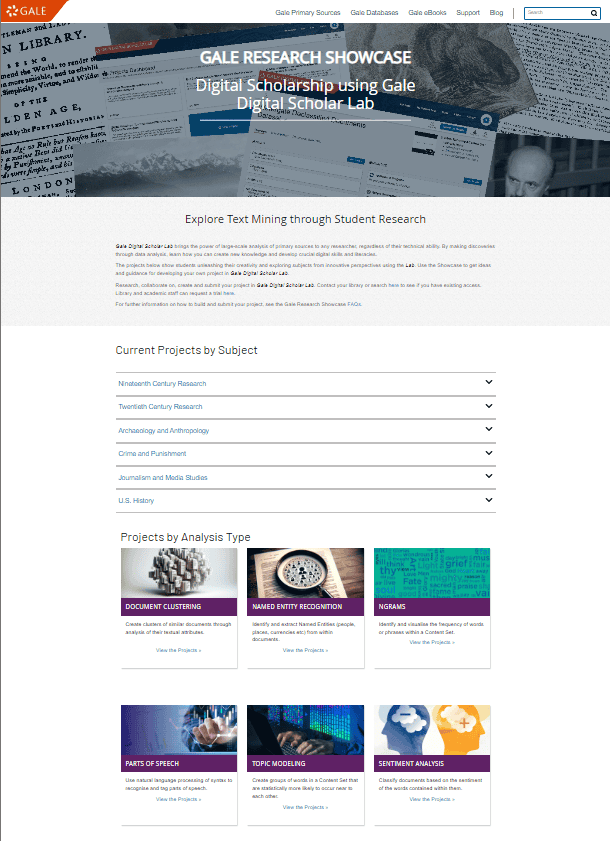│By Becca Gillott and Chris Houghton, Gale Digital Scholar Lab team│
From newspaper columns to academic reports, “The Humanities in Crisis” is a common refrain. It is a widely held fear that, in societies increasingly focused on the risks and benefits of technology in the fourth industrial revolution, studying what it means to be human is seen as increasingly irrelevant.
Irrespective of these fears, the evidence indicates that the teaching of humanities is increasingly under strain in higher education. Where we are in the UK, every summer sees the closure of yet another set of humanities departments. Higher Education assessment criteria like the UK’s Research Excellence Framework and Teaching Excellence Framework have a growing focus on measuring not just the quality, but the impact of disciplines.
This focus on impact has led to interesting developments in higher education institutions as humanities departments find new ways of working and collaborating within and without the institution.
The Influence of Digital Humanities
One significant development has been the increasing integration of technology in humanities practice. The growing influence of Digital Humanities (broadly defined as the confluence of humanities research and computer science) has opened up not only new possibilities for humanities research and teaching, but also for increasing impact.
In recent years, the volume of digital data and the availability of computing power have grown significantly, making research possibilities available to undergraduates that would have been the preserve of the privileged few, even fifteen years ago.
Gale have been at the forefront of these developments, first digitising large collections of historic primary sources, then providing platforms to explore these archives in new ways, and finally developing the first integrated text and data mining platform for the humanities – Gale Digital Scholar Lab.
With institutions striving for impact, Gale is delighted to announce their latest developments designed with just this in mind – Gale Digital Scholar Lab: Projects and Gale Research Showcase.
Gale Digital Scholar Lab: Projects
A significant new addition to the popular Gale Digital Scholar Lab, Projects allows users to take draft materials from their Notebook, and elsewhere in the Lab, and thoughtfully compile them together, along with commentary, into a formal report. Working in tandem with existing Lab features such as the Notebook, Projects allows the researcher to undertake their entire research workflow without needing to leave the platform.
The Projects feature can be found using the ‘My Research’ option in the toolbar at the top of the page. As part of the introduction of the new feature, My Content Sets and Notebook have also been moved to the new My Research dashboard, grouping together all of the user’s personal materials into one hub. This makes it easy for researchers to organise and locate the materials that are central to their research, while moving seamlessly between the different aspects of creating a research project.
Using this new functionality, researchers can create as many Projects as they wish to, both individually and collaboratively within a group environment.
Draft notes from the Notebook, recorded during the project’s workflow, as well as key information from the Content Set Details page, can easily be included using the ‘Add to Project’ button for editing and formal write up. Alongside this existing information, users can add new sections when needed, as well as headers to manage the organisation of their report.
Every section added to the template can be edited and moved, enabling a detailed and comprehensive report to be put together without leaving the Lab. This report can then either be submitted for inclusion in the Gale Research Showcase from directly within the Lab itself, or downloaded for use elsewhere, such as submitting an assignment or creating a research paper.
Gale Research Showcase
Once a researcher chooses to submit their work in Gale Digital Scholar Lab: Projects, it enters a review process with the goal of publication on the brand-new Gale Research Showcase.
Gale is pleased to offer a free peer-review service where any student researcher using the Lab can access the scholarly benefits of having their work reviewed by experts. Expert peer-review is a crucial part of developing high-quality scholarship and is traditionally only available at the higher levels of academia. Yet, with Gale Digital Scholar Lab: Projects, undergraduate and post-graduate researchers can benefit from expert feedback to improve their work.
Once the review of their project has been received, researchers can incorporate the feedback and resubmit it to be considered for inclusion in Gale Research Showcase.
In a first for Gale, the Gale Research Showcase is an open-access repository of student-written digital scholarship. The aim of the Showcase is twofold: to give researchers inspiration and guidance in expanding their horizons and developing their own digital scholarship projects; and to give students and early-career researchers experience of scholarly publishing and the opportunity to increase the impact of their research.
Impact – For All
With these significant developments, the number of scholars who can benefit from participating in digital humanities research, peer-review and publication has increased significantly. By incorporating Gale Digital Scholar Lab in their classrooms and using Projects to develop student work for assessment, instructors can increase the impact of their teaching by encouraging digital skills and literacies in their classes.
It is now much more straightforward for students to create digital scholarship, exploring their topics in brand new ways and making discoveries that would be impossible through traditional methods.
Gale Digital Scholar Lab: Projects gives all students the opportunity to improve their work by benefiting from expert peer-review and to amplify it through publication on the Gale Research Showcase.
In an environment where universities are pursuing ways to increase the impact of the humanities, these developments enable instructors and their students to do just that.
Related blogs
Over the course of April and May, we will publish more blog posts about how to use Gale Digital Scholar Lab’s Projects and new Python scripts in the classroom.
If you liked this post, check out the following blog posts:






